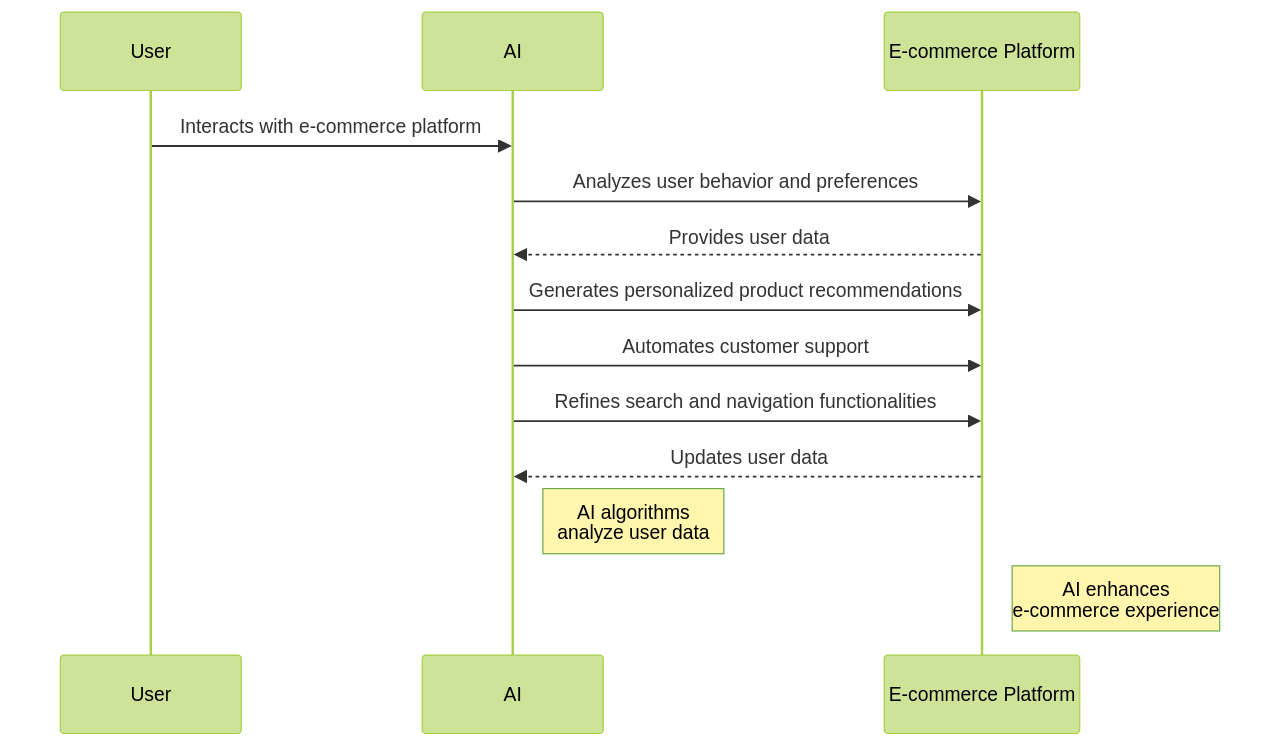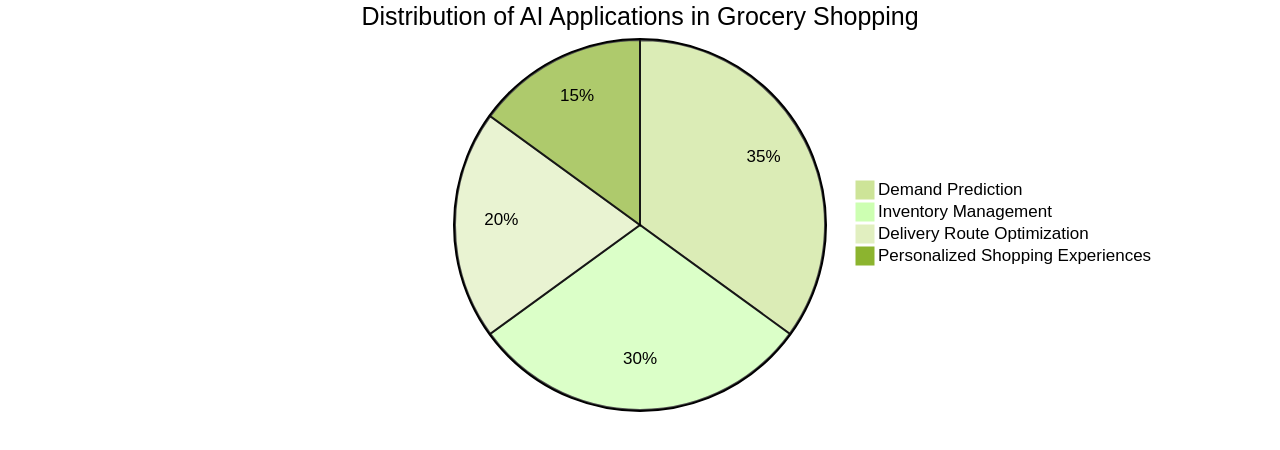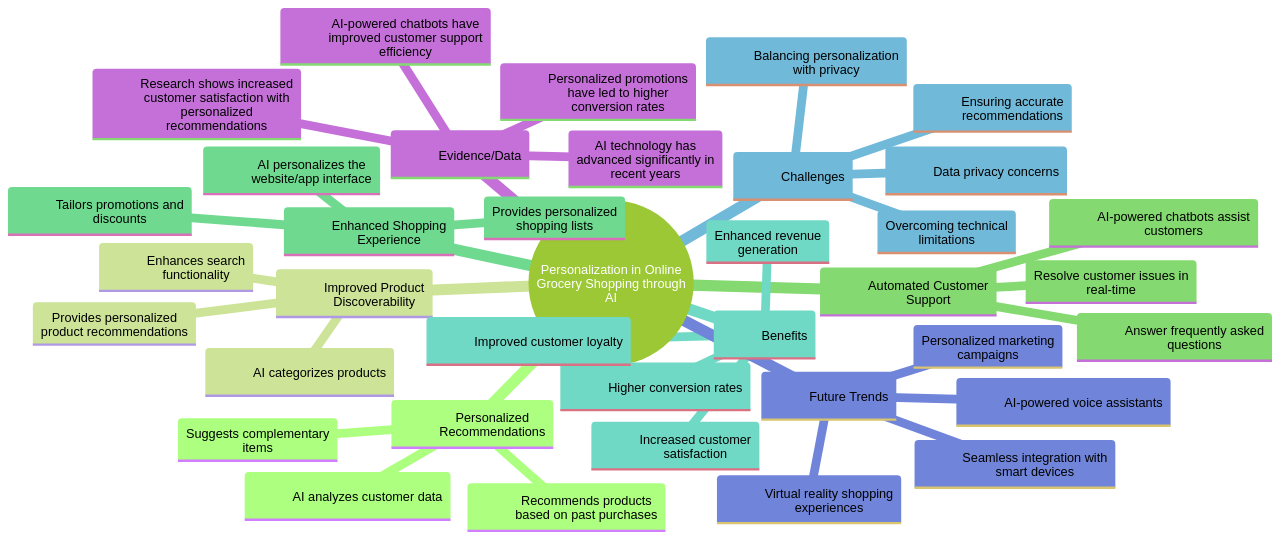Introduction
The evolution of grocery shopping has been greatly influenced by the rise of Artificial Intelligence (AI) and its impact on online platforms. The recent global events, such as the pandemic, have accelerated the shift from physical stores to online platforms, leading to a surge in demand for e-commerce solutions. As businesses navigate through this digital transition, the challenges of managing expansive product inventories, ensuring timely delivery, and providing personalized shopping experiences have become more prominent. AI stands at the forefront of addressing these challenges and reshaping the online grocery shopping landscape.
In this article, we will explore the transformative role of AI in grocery shopping and how it is revolutionizing the e-commerce industry. We will examine real-life examples of successful AI implementations in online grocery stores, such as BigBasket and Tata Cliq. Additionally, we will discuss future trends and how AI is shaping the future of online grocery shopping, including personalized shopping experiences, inventory management, order fulfillment, and waste reduction. By understanding the potential of AI in grocery shopping, businesses can enhance the overall shopping experience, increase operational efficiency, and stay competitive in the evolving digital landscape.
1. The Evolution of Grocery Shopping: From Physical Stores to Online Platforms
AI's transformative role in the digital evolution of grocery shopping has been highlighted by the recent global events.

The pandemic has fast-tracked the shift from physical stores to online platforms, leading to a surge in demand for e-commerce solutions. As businesses navigate through this digital transition, managing expansive product inventories, ensuring timely delivery, and providing personalized shopping experiences pose significant challenges. AI stands at the forefront of addressing these challenges and reshaping the online grocery shopping landscape.
AI is carving a niche in the retail sector, particularly in online shopping, by facilitating more effective customer interaction and streamlining operations. The market for AI-integrated e-commerce solutions is anticipated to reach $168 billion by 2030. AI's role expands to include target marketing techniques for personalization and enhancing customer experience, supporting e-commerce trends such as automation, robotics, and machine learning.
AI's benefits extend beyond improving marketing efforts through voice and speech recognition, chatbots, and virtual agents.
It simplifies demand forecasting and analytics, optimizing targeting and lead generation. AI contributes to online shopping by increasing client retention, automating tasks, and increasing sales. Prominent AI applications in online shopping include product recommendations, early fraud detection, cybersecurity, visual search, and chatbots.
Bigbasket, India's largest online food and grocery store, serves as an example of AI's transformative power. The company successfully installed an AI-powered checkout system in their physical stores using open-source machine learning algorithms for computer vision object recognition. This reduced the training cycle time and increased time to market. The AI-powered self-checkout solution not only improved the retail customer experience but also minimized frontend checkout errors.
AI has become more than an optional add-on; it is a necessity for businesses aiming to stay competitive in the rapidly growing AI in e-commerce market. Businesses that fail to invest in AI risk falling behind in this dynamic and rapidly evolving landscape. AI is revolutionizing the online grocery shopping experience by offering personalized recommendations based on customer preferences, streamlining the ordering process, optimizing delivery routes, and improving inventory management. AI algorithms analyze customer data to understand shopping patterns and predict future needs, enhancing the overall shopping experience and increasing efficiency and customer satisfaction.
2. Understanding Artificial Intelligence (AI) in the Context of E-commerce
The potency of Artificial Intelligence (AI) in transforming the eCommerce sector is profound.

AI is redefining the online shopping realm, and WalletAI is the epitome of this shift. This AI assistant extension employs sophisticated algorithms to proffer personalized product recommendations by scrutinizing user behavior, preferences, and past purchasing history.
WalletAI's innovative conversational interface enables users to participate in real-time dialogues, request advice, and receive guidance throughout their purchasing journey. It's not just about enhancing user experience; it's about streamlining eCommerce platforms by refining search and navigation functionalities. Consequently, customers can discover products more accurately and quickly.
Moreover, WalletAI plays a crucial role in automating customer support within eCommerce platforms. It handles routine inquiries, provides real-time order status updates, and assists with prevalent issues. Essentially, it operates as a smart shopping assistant, offering real-time price comparisons, suggesting alternative products, and providing information on discounts or promotions.
The integration of WalletAI and similar AI technologies is expected to continue reshaping the eCommerce landscape.
These technologies are set to elevate the online shopping experience even further by offering innovative solutions. AI is revolutionizing the eCommerce industry, from generating efficient marketing copy to reshaping inventory management through predictive analytics and machine learning.
In the future, more eCommerce brands are expected to leverage these technologies to enhance customer experiences and maintain a competitive edge. As demonstrated by WalletAI, the potential of AI in eCommerce is vast, promising a future where online shopping is more personalized, efficient, and customer-centric than ever before.
3. Impact of AI on Grocery Shopping: Streamlining Processes and Enhancing Efficiency
Artificial Intelligence (AI) is transforming the world of grocery shopping, enhancing processes and boosting efficiencies.

One of the most impactful applications of AI is in the automation of inventory management, a process that can be greatly improved by the innovative AI solutions provided by Besttoolbars.net. Their team of software developers, designers, and engineers can create customized solutions to streamline inventory processes and optimize management, from real-time inventory tracking to automated reordering based on demand analysis.
AI's role in optimizing delivery routes is another game-changer, ensuring that customers receive their orders promptly.
Advanced algorithms and machine learning techniques can analyze various factors to determine the most efficient delivery routes, reducing delivery times and improving customer satisfaction.
AI has also shown immense potential in predicting product demand, enabling retailers to plan their inventory and pricing strategies effectively. The team at Besttoolbars.net can craft tailored solutions to predict demand for grocery products, enabling grocery stores to increase efficiency and boost sales.
AI's potential in the retail industry extends to providing more personalized shopping experiences. It can generate personalized shopping lists and introduce customers to new products based on their specific dietary needs and preferences. AI algorithms can analyze customer data to identify patterns and trends, allowing retailers to optimize inventory management and enhance the shopping experience.
Despite the challenges, the integration of AI in the grocery shopping experience offers undeniable benefits. The future of grocery shopping is being shaped by AI, with retailers who embrace this technology standing to gain immensely. With the team at Besttoolbars.net ready to provide consulting services and craft innovative solutions, the opportunities for AI in grocery shopping are vast and continually growing.
4. Personalization in Online Grocery Shopping through AI
Online grocery shopping has been revolutionized by the application of Artificial Intelligence (AI), particularly in crafting personalized shopping experiences.

AI can analyze customer data, including purchase history, preferences, and browsing behavior, to deliver personalized recommendations. As a result, customers are presented with tailored product suggestions that align with their shopping habits and preferences, enhancing their shopping journey and fostering customer loyalty.
A compelling example of this is a distributor of lawn and garden parts that adopted Proton, an AI-powered solution. The distributor was struggling with issues such as poor product discoverability and lack of personalization on their e-commerce site. The introduction of Proton drastically transformed their operations. The AI platform utilized predictive models to anticipate customer behavior and offer personalized recommendations. The impact was significant, with customers who received AI-driven product recommendations demonstrating a higher average order value, leading to an increase in order frequency and a 21% boost in revenue per customer.
Furthermore, Proton's AI enhancements are expected to generate an additional $10 million in revenue for the distributor in the coming year. This case study underscores the potential of AI in creating personalized shopping experiences, sometimes referred to as 'artificial intelligence grocery shopping'. In the highly competitive e-commerce arena, such personalization is not just advantageous, it's essential. For instance, if a customer regularly buys organic products, the AI system can suggest other organic items that may appeal to them. This detailed level of personalization is indeed the future of e-commerce.
5. Case Studies: Successful Implementation of AI in Online Grocery Stores
Artificial intelligence (AI) is not just a theory in the realm of online grocery shopping; it's a reality that leading businesses like BigBasket and Tata Cliq have successfully adopted.

For instance, BigBasket utilized AI in conjunction with Amazon SageMaker to train a computer vision model. This model identifies fast-moving consumer goods (FMCG) at checkout, thereby improving the retail customer experience and reducing frontend checkout errors. The outcome of this was a significant 50% reduction in training time and a 20% cost decrease compared to other methods.
In another instance, Haptik, a company specializing in generative AI solutions, partnered with Tata Cliq to develop an AI shopping assistant, Cliq Genie. This assistant provides personalized recommendations, assists users in decision-making, and responds to product queries. In more complex scenarios, it seamlessly connects users to live agents. The implementation of Cliq Genie led to a 24-fold increase in the cart addition rate and an average of 6 user queries answered per conversation with AI automation.
AI implementation brings several benefits to online grocery stores. AI-powered chatbots can provide personalized recommendations based on customer preferences and purchase history. They can also assist customers in finding specific products and answer their queries in real-time. AI algorithms can analyze customer data to identify trends and patterns, optimizing inventory management and demand forecasting. AI can also automate the process of sorting and categorizing products, making it easier for customers to search and navigate the online store.
These case studies underscore the transformative potential of AI in the online grocery shopping industry. It's clear that AI not only streamlines operations but also significantly enhances the customer shopping experience. AI technology can greatly enhance the online grocery shopping experience by making it more convenient, personalized, and efficient. The benefits of AI in transforming the online grocery shopping experience are numerous, and it's clear that the future of grocery shopping lies in AI.
6. Future Trends: How AI is Shaping the Future of Online Grocery Shopping
AI is progressively taking a central role in reshaping the online grocery shopping ecosystem through its advanced algorithms, offering a more personalized shopping journey. Virtual shopping assistants powered by AI are transforming the shopping experience, guiding customers to their preferred products, responding to their inquiries, and even suggesting recipes based on purchased items.
AI's predictive capabilities present a competitive advantage for retailers, as illustrated by Storai's recent launch of the Smart Basket tool. This AI-infused tool offers personalized online grocery shopping experiences, streamlining the purchase journey with features like product promotions and one-click basket repurchases. It also provides reminders based on past purchase history and recommends alternative or complementary products.
AI's transformative potential extends to managing inventory and order fulfillment. As demonstrated by Storai's suite of tools, integrating personalization tools with point-of-sale systems and picker apps enables grocers to manage their inventory and fulfill orders efficiently.
AI also plays a crucial role in reducing food waste in grocery stores, as exemplified by Danish company Too Good To Go. Their AI-powered solution assists supermarkets in managing expiration dates, a significant factor in retail food waste. By offering discounts on goods close to their expiration, AI saves store workers time and effort in tracking down short-dated products.
In summary, the incorporation of AI is marking a new era for online grocery shopping, characterized by personalization, efficiency, and waste reduction. AI enhances the online shopping experience by offering personalized recommendations, optimizing inventory management, enabling chatbot assistance, and improving delivery logistics. Retailers are leveraging AI to offer tailored product suggestions and promotions, improving customer satisfaction, and increasing operational efficiency. AI-powered chatbots and virtual shopping assistants assist shoppers in finding products, answering questions, and providing real-time support, further enhancing the online grocery shopping experience.
Conclusion
The transformative role of Artificial Intelligence (AI) in grocery shopping is evident in the shift from physical stores to online platforms. The recent global events, such as the pandemic, have accelerated this transition, leading to an increased demand for e-commerce solutions. AI addresses the challenges faced by businesses in managing product inventories, ensuring timely delivery, and providing personalized shopping experiences. By leveraging AI technology, businesses can enhance the overall shopping experience, increase operational efficiency, and stay competitive in the evolving digital landscape.
The impact of AI on grocery shopping goes beyond improving marketing efforts and customer interaction. AI streamlines processes such as demand forecasting, inventory management, and order fulfillment. It offers personalized recommendations based on customer preferences and analyzes data to understand shopping patterns and predict future needs. Successful implementations of AI in online grocery stores like BigBasket and Tata Cliq demonstrate its effectiveness in improving the retail customer experience and reducing errors. As businesses embrace AI technologies, they can optimize their operations, offer tailored product suggestions, automate customer support, and provide a more efficient and personalized shopping journey.
To harness the potential of AI in grocery shopping, businesses should invest in AI technologies that can assist with inventory management, demand forecasting, and personalized recommendations. By incorporating AI into their e-commerce platforms, businesses can streamline processes, enhance customer experiences, and gain a competitive edge in the rapidly evolving digital landscape.
Start now to explore how AI can revolutionize your online grocery shopping experience!





